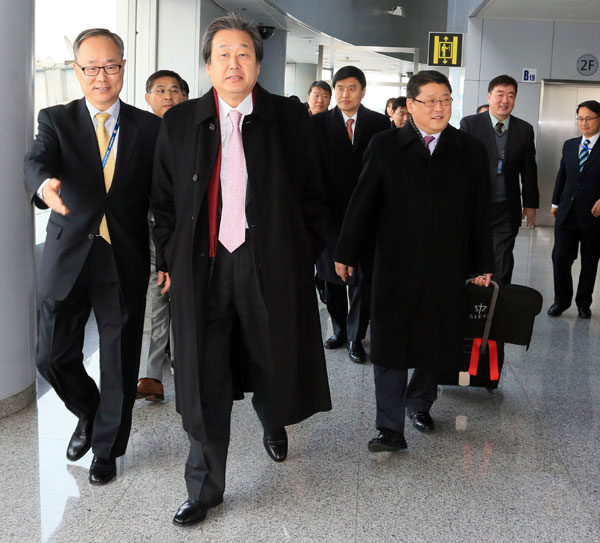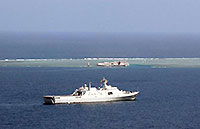China backs UN resolution on DPRK rocket launch
By Li Xiaokun (China Daily) Updated: 2013-01-22 04:09Beijing is involved in negotiations on a draft UN Security Council resolution regarding Pyongyang's December rocket launch in "a constructive way", the Foreign Ministry said on Monday.
Chinese experts said the resolution should balance concerns from all relevant parties, and take regional stability and the security of the Korean Peninsula into consideration.
 |
|
Adelegation of special envoys of the Republic of Korea’s president-elect arrived in Beijing on Monday. The delegation, led by Kim Moo-sung (center), the Saenuri Party’s election campaign manager, is expected to brief Chinese leaders on Seoul’s stance on the situation of the Korean Peninsula. [PROVIDED TO CHINA DAILY] |
Ministry spokesman Hong Lei made the remarks at a daily briefing when asked about reports stating that UN diplomats on Friday said the United States and China have reached a tentative deal on the draft resolution.
"We feel regret that the Democratic People's Republic of Korea went ahead with the launch amid widespread concerns by the international community," Hong said.
"At the same time we believe that any response by the United Nations Security Council should be prudent, moderate, and conducive to peace and stability in the Korean Peninsula, and should prevent the situation from escalating further.
"Based on such a stance, China has constructively participated in the recent UN Security Council negotiations," he said.
Washington has long pursued a resolution imposing new sanctions on Pyongyang, while Beijing was worried it would further irritate the DPRK and destabilize regional security.
"Our position is that the North Korean rocket launch is a violation of a UN Security Council resolution, so the council should react," said Russian UN Ambassador Vitaly Churkin, according to Russia's RIA Novosti News Agency.
China opposes extending the existing sanctions on Pyongyang, and the new resolution — a result of long-term negotiations — will not really reinforce sanctions against Pyongyang, said Shi Yuanhua, director of the Center for Korean Studies at the Institute of International Studies at Fudan University in Shanghai.
It is possible that Pyongyang will react to the UN resolution with a third nuclear test, said Zhang Liangui, an expert on Korean studies at the central Party school.
"And if the international community presses the DPRK too hard, Pyongyang might also abandon the nonproliferation promise it made in 2005, refuse to restart the Six-Party Talks and refuse to talk about nuclear weapons with any country."
In another development, a delegation of special envoys sent by the Republic of Korea's president-elect Park Geun-hye arrived in Beijing on Monday for a four-day visit.
The move broke the ROK tradition of sending its first envoys to the US at the beginning of a new administration.
"We came to create an opportunity to build new trust," Kim Moo-sung, head of the four-member delegation and a key manager of Park's presidential campaign last year, told reporters upon arrival in Beijing.
Park told Kim before the China visit that the delegation should inform the Chinese leaders that Seoul stands firmly opposed to Pyongyang developing nuclear weapons and will take action against any provocations.
The ROK will take over the presidency of the UN Security Council in February.
Park also said her country would continue providing humanitarian support to the DPRK and wants to open a window of "dialogue and cooperation".
She said she envisions an important role for Beijing on the Korean Peninsula issue.
Zhang said the agenda of Park's delegation extends beyond the nuclear issue.
"The visit reflects the extreme importance the new administration attaches to Beijing, and aims to forge closer economic and strategic ties," he said.
Pu Zhendong and Reuters contributed to this story.
Contact the writer at lixiaokun@chinadaily.com.cn







